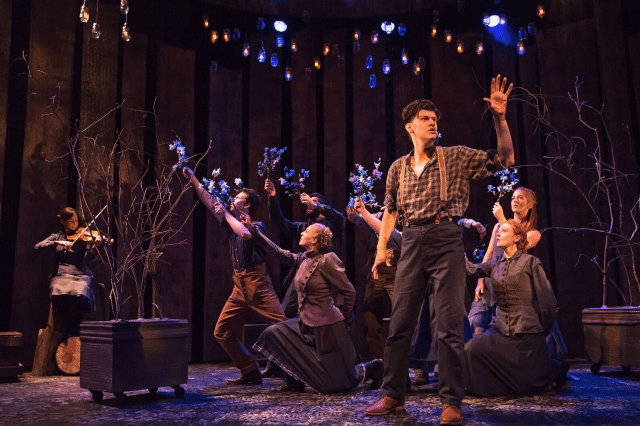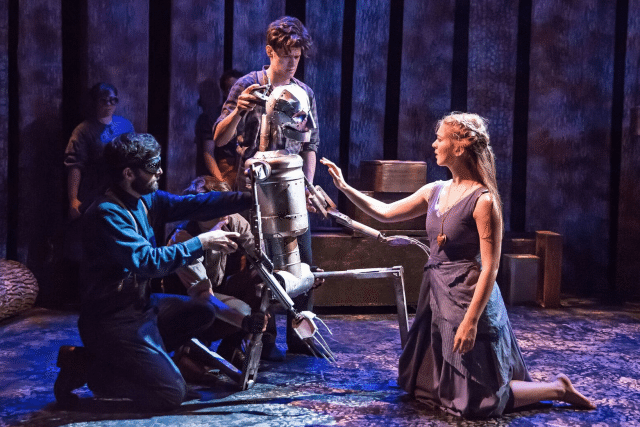

In The Woodsman, we discover how the Tin Man from Frank L. Baum’s The Wizard of Oz, encountered his fate. Imagined by the wizards of Strangemen & Co. as a folk tale, we learn the title character’s story through gorgeous music and evocative puppetry which makes for a unique night at the theater. We learned more about this production from Creator, Director, Set and Puppet Designer, and Leading Man, James Ortiz.
When dealing with Oz mythology, we can go the Baum way, the Maguire way, or the MGM way. How did you pick which road to follow when creating The Woodsman?
That's a great question. I think whenever you create a new vision of an existing piece of material, you really need to find your own way, if that makes any sense. I started by examining everything Baum had written about the event surrounding the Tin Woodsman's origins, and then filtered those events through the caveat that Baum says Oz is a real place. I first approached the magic, the heart and wonder of his words by asking what that event could have been like for real people in a real Oz and then the piece started forming from there.
How do you try to satisfy all the Oz fans equally?
That's a tall order. If I had actually thought about that deeply, I'm sure I wouldn't get out of bed. In truth, I’m not sure if we’ve satisfied all the fans. My approach was to try to identify the core values of Baum's writings (believe in yourself; home is more than just a place; courage is facing danger when you are afraid) and then attempt to translate that onstage. I think there's something valuable in the fact that I started with my passion for these stories. It’s like that line from Sunday in the Park with George, “…let it come from you, then it will be new.”
What got you into Oz mythology?
I think Baum’s writings were my first interaction with a mythology or fantasy world of any kind. The Wonderful Wizard of Oz was the first chapter book that was ever read to me, so I'm pretty sure it made a lasting impression. I also love that unlike most fantasy stories where the narrative's driving force is usually a hero's quest to save the world or to right a horrible wrong, the driving force behind most of the Oz books is something far quieter and more identifiable: personal fulfillment. I'd argue that every character in an Oz book is a societal misfit who doesn't believe in their own self-worth or abilities, and their stories put them through a series of trials to help discover the best parts of themselves. Amazingly, because they are so open-heartedly seeking these personal truths, they end up changing the world and righting wrongs along the way. I find this to be endlessly identifiable at any age. It’s really quite beautiful. Maybe that's why I was drawn to this.
The songs by Edward W. Hardy feel like a combination of working songs like "Heigh Ho" and other folk tunes. How did you find the style of music you needed to tell the story?
It was about trying to depict Oz through the filter of the world in which Baum wrote---the latter half of the 1800's in America which was a really extraordinarily difficult time. We were only recently settling throughout the western half of the country and our entire existence was about work. The fact that these people wouldn't have access to a lot of varied instruments means that we're talking about songs being sung while working. Maybe on a good day, that neighbor that can play the fiddle would honor us with a tune or two. Like the rest of the show, I needed to find a simplicity and a pre-Civil War fiddle type of sound seemed like the only way to go.
Even though the show it is set in a fantastical world, The Woodsman makes a compelling case for the way in which technology is an essential part of our society. But while the show highlights the marvels of technological advancement, the staging is incredibly human. Would you say The Woodsman expresses this dichotomy and tries to expose both sides of the debate?
Ultimately, I think a story about a man losing his heart after becoming a machine is an endlessly compelling narrative with many layers and plenty of real-world ramifications. Machinery exists to make the quality of our lives better but does it? I don't know. I think Baum was also fascinated with both sides of this question. However, I would rather let the audiences dissect this one!

A big part of the puppetry in your play and shows like SeaWife demand that the audiences actively invest in the performances in order to help "complete the process." Do you find that active audiences are rare in modern theatre?
Funnily enough, no. Puppetry is such a curious art form, and for whatever reason, it just forces the audience to fill in the blanks for what the puppet characters are thinking and feeling. We're making a lot of shapes up there as we puppeteer, but the audience is filling in those spaces and believing in them in a way that's totally magical and full of awe. I happily could go on for days about audiences’ reactions and their connection to puppetry.
The show is practically wordless which makes it ideal for international audiences. Have you started the process of mounting productions in other parts of the world?
Those conversations are certainly beginning and pieces are certainly moving and it’s something that we're all interested in. Right now, we’re just trying to make sure we put on a killer show every night at here at New World Stages.
You are playing the Woodsman now, but what do you look forward to the most when someone else tackles the part? Do you feel his movements, humanity and "performance" will be different from actor to actor?
Totally. Selfishly, I’m actually just excited to someday be able to see this show because of course, I never have.
Do you have plans of expanding on the prequel mythology by tackling other Oz-ian characters?
Oh, I have some other things cooking, both Oz and non-Oz alike but Oz is like a great old pair of shoes for me. I can put them on anytime and they'll never wear out on me.
If you could do a puppet version of a classic Broadway musical what would it be?
Yikes! That's a hard question to answer. Well, I love the interaction of puppet and actor. I think the actor makes the puppet more alive, and the puppet makes the actor more believable in an imagined circumstance. I wouldn't replace actors with puppets in a show, but I would certainly continue to use them to heighten parts of a story. I firmly believe they should only be used if they can help illuminate some deep question or conversation that's buried in the script.
The Woodsman is running through May 29. For tickets and more click here.